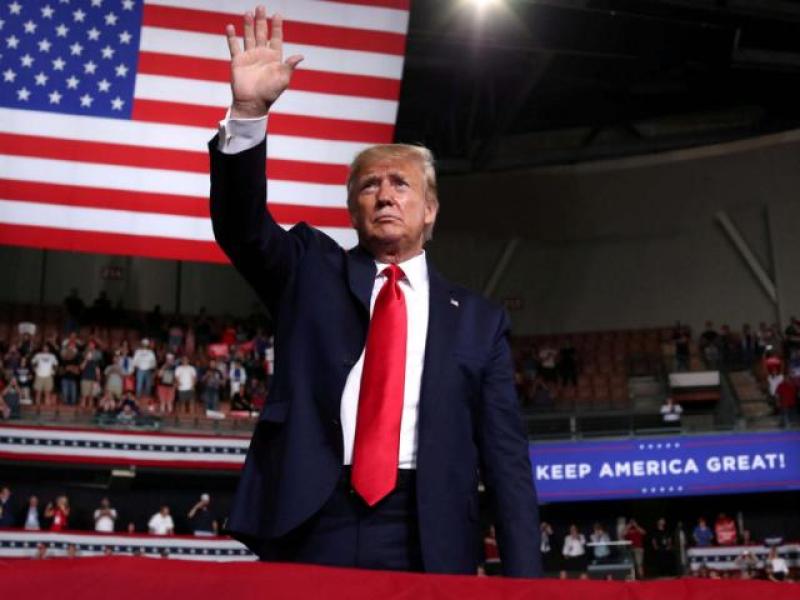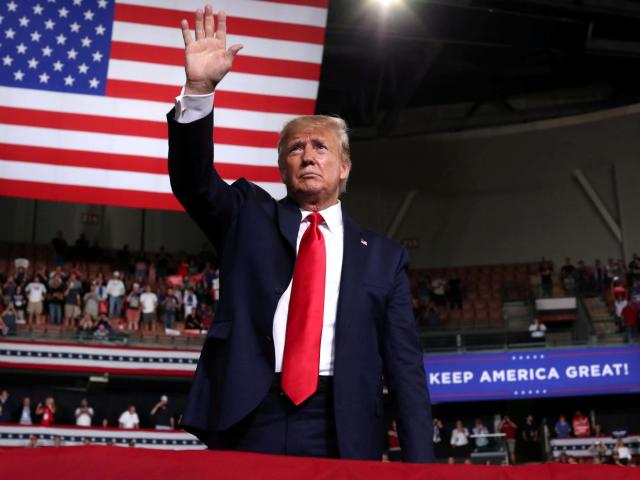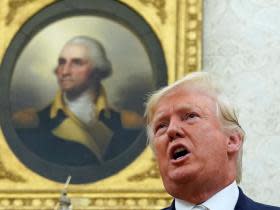US mental health staff warned not to contradict Trump after mass shootings


U.S.
US mental health staff warned not to contradict Trump after mass shootings

When Donald Trump targeted mental illness as the cause of the mass shootings that killed 31 people in El Paso , Texas, and Dayton , Ohio, federal health officials made sure no government experts might contradict him.
A Health and Human Services (HHS) directive on 5 August warned communication staffers not to post anything on social media related to mental health , violence and mass shootings without prior approval.
That alarmed some government mental health experts who said they felt muzzled at a moment many Americans were searching for answers to the US epidemic of mass shootings, said three agency employees.
Many researchers and mental health experts said Trump’s comments contradicted well-established research.
“Mental illness and hatred pull the trigger. Not the gun,” Trump said immediately after the shootings. In the following days, he doubled down on his statement, arguing that America should reopen mental institutions shuttered decades ago as a way to address mass shootings.
While mental illness is sometimes a factor in such shootings, it is rarely a predictor, according to a growing body of research. Most studies of mass shooters have found that no more than a quarter of them have diagnosed mental illness. Researchers have noted more commonly shared attributes include a strong sense of resentment, desire for notoriety, obsession with other shooters, a history of domestic violence, narcissism and access to firearms.
“To say that scientists and experts who know the data and facts best are not allowed to speak - that’s very concerning,” said Dominic Sisti, a University of Pennsylvania professor who studies ethics in mental health and psychiatry. “It’s especially alarming that they’re doing this at a critical moment when what we need most is research and evidence-based facts about mental illness.”
An HHS employee who spoke on the condition of anonymity to relate internal discussions said he had “no doubt this was meant to prevent anybody from making any statements that might contradict the president.”
“We understand we’re not supposed to contradict the president, but it’s not typical” for the administration to require that all social media posts be cleared by senior officials, he added.
On 5 August, Trump was scheduled to speak after the weekend shootings. That morning, some HHS employees, including those at the National Institutes of Health (NIH), received an email asking those who contribute to official social media accounts to hold off on posts until “we get the green light from HHS,” which was expected after the president spoke, according to a copy of the email obtained by The Washington Post.
Later that afternoon, some employees received another email from Renate Myles, an NIH spokeswoman. Social media posts could resume, the note said, but employees were asked to “please send any posts related to mental health, violence or other topics associated with mass shootings for review before posting.”
The second directive applied most directly to the National Institutes of Mental Health, where nearly all of the agency’s social media activities relate to mental health. It remains unclear how many people received that instruction, which was lifted by week’s end.
“It’s the department’s long-standing practice to not get ahead of the president’s remarks,” said HHS spokeswoman Caitlin Oakley. “This allows the president to share his message first with the nation. Any suggestions that this was a formal policy put in place related to social media, or meant to stymie work on this issue, are factually inaccurate. These were staff-level discussions seeking to be sensitive and respectful to the victims and their families affected by tragedies of that weekend.”
By contrast, two former senior health officials in the Obama administration said they did not recall ever receiving such a directive after a mass shooting.
In the days and months following the mass shooting that killed 20 first graders and six staff members at Sandy Hook Elementary School in Newtown, Connecticut, the National Institutes of Mental Health (NIMH) spoke extensively about mental illness and violence. “The conversation has evolved, recognising that violence most often associated with mental illness is suicide, and that most violence is unrelated to mental illness,” the NIMH director said at a meeting three months later. NIMH also hosted a special panel discussion, “How Sandy Hook is Changing the Conversation,” during which mental health experts worked to dispel stereotypes that link mental illness to violence.
After this month’s shootings, however, NIMH and its director were largely silent on the shooting. The only mention on the official NIMH Twitter account was a retweet of the NIH account, directing those struggling with grief and emotional distress to the Substance Abuse and Mental Health Services Administration for counselling and support.
“There is this climate of concern whether you can make a statement based on facts,” said a National Institutes of Health employee. “I see people struggling with how to interpret it. What are we allowed to do?”
Trump’s comments after the shootings sparked widespread concern among mental health experts and advocates.
“Research has shown that only a very small percentage of violent acts are committed by people who are diagnosed with, or in treatment for, mental illness,” Rosie Phillips Davis, president of the American Psychological Association, said in a statement.
Mental health advocates also worry that blaming the mentally ill for mass shootings will spread fear and keep people from seeking help.
In a 2018 report on 63 shooters, the FBI found that 25 percent had been diagnosed with a mental illness. Of those, three had been diagnosed with a psychotic disorder. In a 2015 study that examined 226 men who committed or tried to commit mass killings, 22 per cent could be considered mentally ill. Researchers also point out that other countries have similar rates of mental illness but only a fraction of the United States’s fatalities from shootings. The key factor that sets the United States apart from the rest of the world, epidemiologists say, is the easy availability of guns.
Trump’s latest argument – that reopening mental asylums would help stop mass shootings – has similarly drawn concern. In a June study, Sisti of the University of Pennsylvania and fellow researcher Isabel Perera looked at other countries that shut down their psychiatric institutions as America did, and compared their rates of mass shootings. They found no relationship between deinstitutionalisation and mass shootings.
“Mental illness as an explanation for mass shootings is a trope, a distraction,” Sisti said.
The Washington Post



When Donald Trump targeted mental illness as the cause of the mass shootings that killed 31 people in El Paso , Texas, and Dayton , Ohio, federal health officials made sure no government experts might contradict him.
A Health and Human Services (HHS) directive on 5 August warned communication staffers not to post anything on social media related to mental health , violence and mass shootings without prior approval.
That alarmed some government mental health experts who said they felt muzzled at a moment many Americans were searching for answers to the US epidemic of mass shootings, said three agency employees.
Many researchers and mental health experts said Trump’s comments contradicted well-established research.
“Mental illness and hatred pull the trigger. Not the gun,” Trump said immediately after the shootings. In the following days, he doubled down on his statement, arguing that America should reopen mental institutions shuttered decades ago as a way to address mass shootings.
While mental illness is sometimes a factor in such shootings, it is rarely a predictor, according to a growing body of research. Most studies of mass shooters have found that no more than a quarter of them have diagnosed mental illness. Researchers have noted more commonly shared attributes include a strong sense of resentment, desire for notoriety, obsession with other shooters, a history of domestic violence, narcissism and access to firearms.
“To say that scientists and experts who know the data and facts best are not allowed to speak - that’s very concerning,” said Dominic Sisti, a University of Pennsylvania professor who studies ethics in mental health and psychiatry. “It’s especially alarming that they’re doing this at a critical moment when what we need most is research and evidence-based facts about mental illness.”
An HHS employee who spoke on the condition of anonymity to relate internal discussions said he had “no doubt this was meant to prevent anybody from making any statements that might contradict the president.”
“We understand we’re not supposed to contradict the president, but it’s not typical” for the administration to require that all social media posts be cleared by senior officials, he added.
You must not contradict Herr Twitler
Trump can go fuck himself the fucking wanna be dictator trying to censor people.
Does sound pretty dictatorial.
My thoughts exactly - Fuck tRump!
And the mentally ill horse he rode in on.
That poor horse....
It was sane before Trump mounted it. It is now crazy and sway backed from the weight of his fat ass. It is now only good for "Crazy Glue".
Yeah, my thoughts exactly!